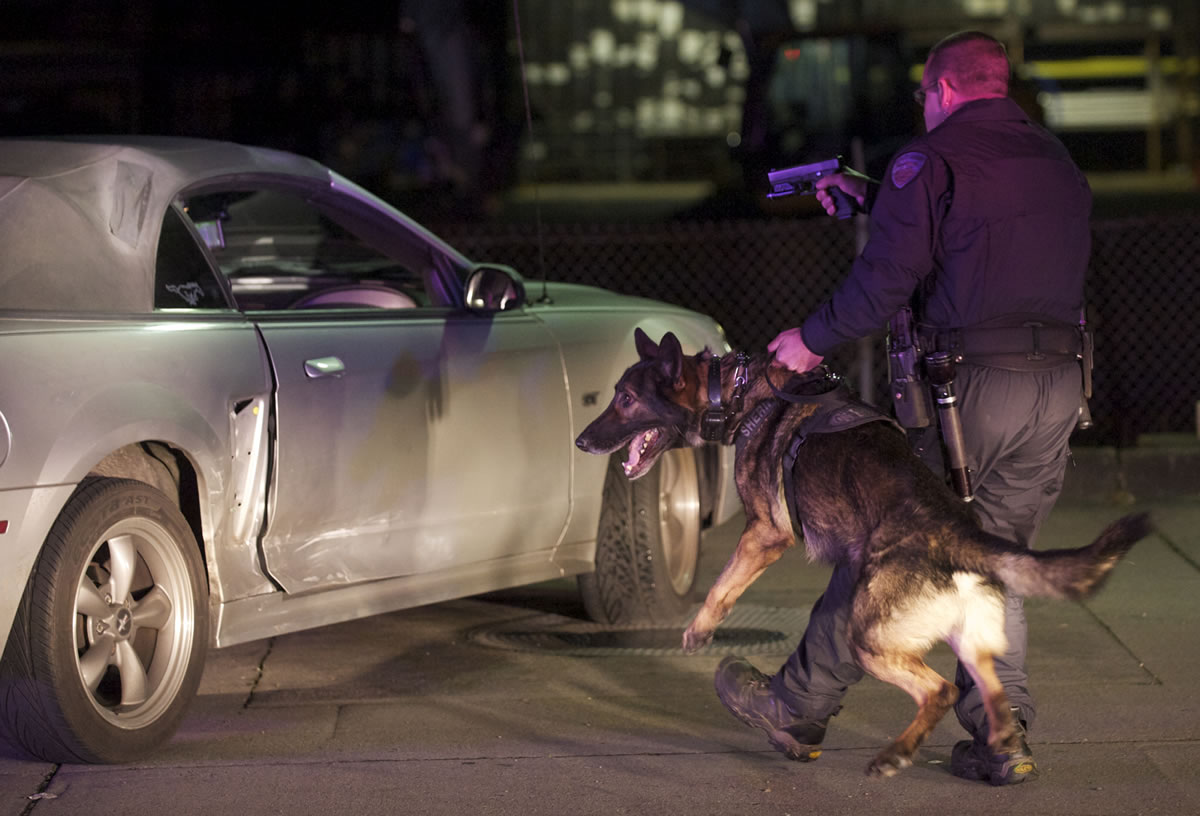Sheriff’s Deputy Brian Ellithorpe will tell you being a member of the regional K-9 team is one of the “most consistently inconsistent” jobs you can do as a cop.
Officers assist patrol with virtually any call in which a suspect is on the scene, recently fled or will potentially flee. They usually work afternoons or evenings, but they are always on call.
“It can be the most rewarding specialty position in the job,” Battle Ground K-9 Officer Chris Crouch said. It can also be challenging.
“If you don’t find the bad guy, you’re left shaking your head wondering if you missed a turn along the way,” he said of unsuccessful tracking cases. “… It’s a constant game trying to figure out what these people did and why your dog didn’t find them.”
Crouch and his dog — Haulf, an 8-year-old German shepherd — and Ellithorpe and his dog — Saver, a 6-year-old German shepherd — work with other officers and dogs from Vancouver, Washougal, BNSF Railway police and the Skamania and Clark County sheriff’s offices.
Vancouver police Special Operations Sgt. Kathy McNicholas said all Vancouver Police Department dogs are trained to do patrol work and narcotics detection — as are dogs from the sheriff’s offices and Battle Ground police. BNSF’s dog is trained to detect explosives, and Washougal police’s is trained only to find drugs. VPD, Battle Ground and sheriff’s dogs are usually bred in Europe and brought to the United States for initial training.
They’re expensive pieces of equipment.
VPD’s newest dogs, Ike, a Belgian Malinois, and Ory, a German shepherd, both 2 years old, were bought earlier this year to replace retiring canines Kenai and Farley. Both were paid for by community donations; Ike cost $8,000, and Ory was $9,600.
Crouch said they’re valuable assets to the police force and can do jobs more safely than their human counterparts.
Haulf is also trained to clear rooms, crawl spaces and attics for the Southwest Washington Regional SWAT Team.
“We’re going into dark environments; the dog’s nose can help identify potential threats much faster than we ever could,” he said.
Sometimes that means putting a dog into dangerous situations.
Ellithorpe recalled one case in which he thought he was sending his former K-9, Eiko, to his death.
In December 2003, the two were searching for an armed man who allegedly tried to ram a police car. Eiko was off his lead searching for the man and made a sharp turn toward a group of bushes, Ellithorpe said. He knew that must be where the suspect was hiding.
“I can’t call him back,” Ellithorpe said when recently recalling the event. “I wanted to. You love the dog, but that’s his job.”
The dog eventually found the man, Gregory “Scott” Grant, and latched onto his right arm. Grant started punching Eiko in the head “as hard as he could,” and attempted to grab the gun in his coat pocket, Elli-thorpe said. Deputies eventually got close enough to take the man down and took him into custody.
Eiko was OK. Ellithorpe was shaken.
“It was just a very hard pill to swallow, even thinking about it today,” he said. “It’s real scary to send your dog into something like that.”
Handlers and their dogs form a special bond.
“I spend more time with my dog than with my wife,” Ellithorpe said.
Saver doesn’t live the same life as the other family dog, Margie, a 13-year-old Lhasa apso. The police dog stays in a concrete pad in Elli-thorpe’s backyard in his down time.
He’ll be let out of the kennel on occasion, but generally his work gives him enough exercise. Ellithorpe said he and the dog must also be ready to respond to a call at a moment’s notice.
Crouch of Battle Ground said his dog also stays in his outdoor kennel most of the time. When he’s out of the kennel, it’s time to work, not play, he said.
“They don’t necessarily know that they’re looking for cocaine, but if they find something that smells like cocaine, they get to play with a toy,” he said.
Paul Suarez: 360-735-4522; http://www.twitter.com/col_cops; paul.suarez@columbian.com.



